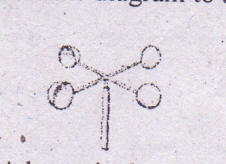Year :
2017
Title :
Biology
Exam :
JAMB Exam
Paper 1 | Objectives
1 - 10 of 49 Questions
| # | Question | Ans |
|---|---|---|
| 1. |
The matured sex cell which takes part in sexual reproduction is referred to as A. gamete B. fetus C. embryo D. zygote |
|
| 2. |
The biome that is characterized with large herbivores, few and scattered fire resistant trees is A. savanna B. tropical rain forest C. montane forest D. desert |
|
| 3. |
Red blood cells are also known as _________? A. erythrocytes B. thrombocytes C. phagocytes D. leucocytes |
|
| 4. |
The joint between the femur and tibia is known as ________? A. hinge joint B. ball-and-socket joint C. pivot joint D. gliding joint |
|
| 5. |
What is the primary function of cofactors? A. To aid in enzyme function B. To synthesize enzymes C. To inhibit enzymes D. To break down old enzymes |
|
| 6. |
 Use the diagram below to answer the question that follow: A. hygrometer B. Wind vane C. Anemometer D. rain gauge Detailed SolutionAn anemometer is a device used for measuring wind speed, and is also a common weather station instrument.There is an explanation video available below. |
|
| 7. |
Coloration of the eye is ______ variation A. physiological B. morphological C. adaptive D. recessive |
|
| 8. |
Which of the following choices correctly describes the composition of the cell membrane? A. contains only lipids B. contains lipids and protein C. contains lipids and cytosol D. contains only proteins |
|
| 9. |
The feeding relationship among a set of members of a community is referred to as _______? A. a food web B. pyramid of energy C. a food chain D. pyramid of number Detailed SolutionFeeding relationships between organisms in a community are represented by food chains, which show the sequence in which organisms feed on each other. The chain generally begins with an autotroph such as a green plant (e.g. stinging nettle ---> small tortoiseshell butterfly caterpillar --> house sparrow --> sparrowhawk), or with dead organic matter (detritus) (e.g. leaf litter --> earthworm --> young blackbird --> fox). The arrows indicate the passage of food, and therefore energy flow, from one organism to another.Pyramids of energy are the most accurate representation of feeding relationships in a community, providing information about the amount of energy flowing through |
|
| 10. |
Nitrogen is released into the atmosphere when ________ A. plants absorbs mineral salt B. sugar is completely broken down C. through plant uptake D. when lightning strike |
| 1. |
The matured sex cell which takes part in sexual reproduction is referred to as A. gamete B. fetus C. embryo D. zygote |
|
| 2. |
The biome that is characterized with large herbivores, few and scattered fire resistant trees is A. savanna B. tropical rain forest C. montane forest D. desert |
|
| 3. |
Red blood cells are also known as _________? A. erythrocytes B. thrombocytes C. phagocytes D. leucocytes |
|
| 4. |
The joint between the femur and tibia is known as ________? A. hinge joint B. ball-and-socket joint C. pivot joint D. gliding joint |
|
| 5. |
What is the primary function of cofactors? A. To aid in enzyme function B. To synthesize enzymes C. To inhibit enzymes D. To break down old enzymes |
| 6. |
 Use the diagram below to answer the question that follow: A. hygrometer B. Wind vane C. Anemometer D. rain gauge Detailed SolutionAn anemometer is a device used for measuring wind speed, and is also a common weather station instrument.There is an explanation video available below. |
|
| 7. |
Coloration of the eye is ______ variation A. physiological B. morphological C. adaptive D. recessive |
|
| 8. |
Which of the following choices correctly describes the composition of the cell membrane? A. contains only lipids B. contains lipids and protein C. contains lipids and cytosol D. contains only proteins |
|
| 9. |
The feeding relationship among a set of members of a community is referred to as _______? A. a food web B. pyramid of energy C. a food chain D. pyramid of number Detailed SolutionFeeding relationships between organisms in a community are represented by food chains, which show the sequence in which organisms feed on each other. The chain generally begins with an autotroph such as a green plant (e.g. stinging nettle ---> small tortoiseshell butterfly caterpillar --> house sparrow --> sparrowhawk), or with dead organic matter (detritus) (e.g. leaf litter --> earthworm --> young blackbird --> fox). The arrows indicate the passage of food, and therefore energy flow, from one organism to another.Pyramids of energy are the most accurate representation of feeding relationships in a community, providing information about the amount of energy flowing through |
|
| 10. |
Nitrogen is released into the atmosphere when ________ A. plants absorbs mineral salt B. sugar is completely broken down C. through plant uptake D. when lightning strike |